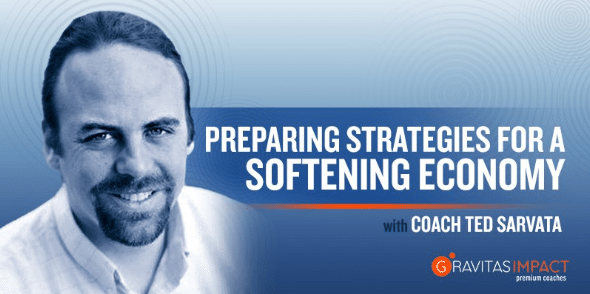
One of the overarching conversations throughout 2018 was about the growing potential for an economic downturn in the next 24 months. Experts pointed to a number of possible triggers, including trade tensions, rising interest rates and oil prices. When another recession will hit is hard to calculate, but there can be no doubt that questions and concerns about a softening economy have risen among economists, owners and consumers alike. Therefore, leaders should already be taking steps to prepare their business for a potential economic downturn.
With that in mind, we reached out to Gravitas Impact premium coach Ted Sarvata for some insight on how businesses can develop a solid recession strategy. Here’s what he had to say.
Initial Do’s and Don’ts
As the economy begins to soften, leaders may find themselves uncovering problem areas that were previously overlooked.
“When a rising tide is lifting all boats, it can be easy to ignore how leaky our own boat is, or to pay less attention to where our boat is going,” Sarvata said.“When the tide starts to fall, those weaknesses will be exposed.”
Recognizing this, however, Sarvata cautions against making initial knee jerk decisions.
“When the economy begins to weaken, don’t throw out your existing strategy and chase every deal you can,” he said. “Do take the opportunity to sharpen your strategy. Is your core customer clear? Is all your communication pointed directly at that person’s needs, wants and fears? Are you clear what you’re promising to this person and how they can hold you accountable if you fall short?”’
Sarvata also encourages leaders to avoid focusing solely on tactical areas, such as cutting costs.“You can’t ignore the tactical,” he said. “But basing them on strategy rather than circumstance builds long-term value. Focus on where your strategy can set you apart from the rest of the eld and help you grow the business in spite of macroeconomic trends. As competitors falter, more opportunities may open up during a soft economy. Think about what that might mean for your business. Where can you sharpen your guarantee to make your customers feel safer and more secure working with you than anyone else?”
Think Of The Customers
Sarvata’s advice for building a strong strategy in unstable circumstances is remarkably customer-centric and may seem counter-intuitive to some.
“A downturn is one such circumstance,” Sarvata said. “Michael Porter described strategy as the creation of a unique and valuable position that requires tradeoffs and involves a fit among activities. A downturn is an excellent time to address those tradeoffs because you’re looking for places to cut costs. Redouble your efforts to meet the needs of your core customer, not their wants.”
Taking this a little deeper, Sarvata says:
“When your customers are feeling more resource-constrained, it’s more important than ever to sharpen your focus. When your customer is flush with cash, they may be more willing pay for frills and nice-to-haves, but as they look to cut costs, they can be ruthless in re-orienting spending towards value and necessities. Perhaps this is a good time to raise prices, as they can’t do without your product or service. Avoid conventional wisdom. Where can you unlock more value for your customer and yourself?”
The Benefits of a Coach
While leaders may be hesitant to spend more money during a downturn, investing in a coach can actually be a smart move. Sarvata says that as the economy softens, the risk of a misstep rises. This makes an outside perspective, one that can provide you with a systemic way of thinking through the issues, all the more important.
“A coach will help keep your focus on where you’re heading 10 or more years out, which will result in execution decisions that leave you stronger than you would be if you ignored strategy and simply cut costs to try to survive. A coach can guide you through this process and won’t let you fall into the execution trap.”Tell us about your own strategies for thriving in a recession! If you’re a CEO, how would you build a recession strategy? If you’re a coach, what other advice would you give to a client?
